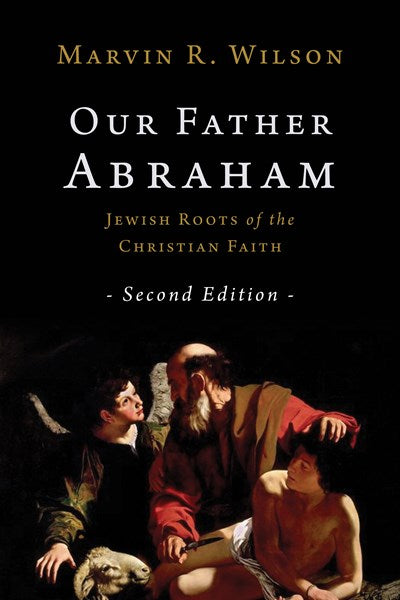Our Father Abraham: Jewish Roots of the Christian Faith Spiral-Bound |
Marvin R. Wilson
Our Father Abraham: Jewish Roots of the Christian Faith

Although the roots of Christianity run deep into Hebrew soil, many Christians remain regrettably uninformed about the rich Jewish heritage of the church. Our Father Abraham delineates the vital link between Judaism and Christianity, exemplified by the common ancestry of the two faiths traceable back to Abraham. Marvin Wilson calls Christians to reexamine their Semitic heritage to regain a more authentically biblical understanding of what they believe and practice.
Wilson, a trusted voice among both Jews and Christians, speaks to both past and present, first developing a historical perspective on the Jewish origins of the church and then discussing how the church can become more attuned to the Hebraic mindset of Scripture. Drawing from his own extensive experience, he also offers valuable practical guidance for salutary interaction between Christians and Jews. Discussion questions at the end of each chapter make this book especially suitable for use in groups—Christian, Jewish, or interfaith—as readers strive to make sense of their own faith in connection with the other.
The second edition of Our Father Abraham features a new preface, an expanded bibliography of recent relevant works, and two new chapters: one that discusses Jewish-Christian relations after the Holocaust and another that reflects on Wilson’s own fifty-plus-year career as an evangelical Christian deeply committed to interfaith dialogue. As Christians and Jews feel a growing need for mutual support in an increasingly secular Western world, Wilson’s widely acclaimed book will offer encouragement and wise guidance toward this worthy end.
— Rabbi Yehiel E. Poupko
Rabbinic Scholar at the Jewish Federation of Chicago
“The timeliness of Marv Wilson’s book was evident by its initial reception and growing audience over the years. Three decades later, this second edition shows the timelessness of both the subject and his insights.”
— James Whitman
Center for Judaic-Christian Studies
Praise for the first edition:
“Our Father Abraham is a stunning achievement! Marvin Wilson has written a magnificent book that breaks new ground in furthering positive Christian-Jewish relations. His superb scholarship is combined with many concrete suggestions for building a new relationship between the church and the synagogue, between Christians and Jews.”
— Rabbi A. James Rudin
The American Jewish Committee
“An ambitious book, sweeping in scope. Wilson has thrown down a theological gaunt¬let, challenging Christians of all kinds to reform a two-thousand-year-old history of misunderstanding Jews and misinterpreting our own sources. Our Father Abraham does not pretend to be the last word in the dialogue, but it is a powerful first salvo!”
— Carl E. Armerding
Regent College
“For too long discussion of the Jewishness of Jesus has remained academic. Few schol¬ars have had the interest or ability to unfold the practical meaning of the Gospels’ Jewish roots for today’s church. Wilson has finally filled that void. And the result is simply revolutionary. For the first time someone has given the person in the pew an understanding of just what the Jewishness of Jesus means for his or her everyday life.”
— Jerusalem Perspective
“A distinctive exposition of what it means for today’s church to be part of Abraham’s spiritual family. . . . Refreshing and enlightening.”
—Journal of Religion
“A magnificent achievement in calling the entire body of Gentile Christianity to reassess the great religion to which it is permanently indebted.”
— Christian Scholar’s Review
“A thoroughly fascinating and enjoyable book. . . . Wilson’s goal is to show the Jewish roots of Christianity and of Jesus . . . and improve interfaith understanding. He suc¬ceeds brilliantly.”
— Jewish Advocate
“A major breakthrough for evangelicals working in the area of Christian-Jewish relations.”
— Journal of the Evangelical Theological Society
“It is undoubtedly Wilson’s intention that all of us come to see our differences as more concerned with means than ends, and to a great degree he succeeds. I recommend this book to anyone with a well-thumbed Bible, but especially to church and synagogue groups (together, whenever possible) who are interested in finding out where the other half lives.”
— Journal of Ecumenical Studies